Are you daunted by the supplement aisle at your grocery store? If you are like me you probably pick up a few items for yourself like a multivitamin or vitamin D3. And you have most likely asked yourself if your children really need nutritional supplements? I am trying to provide my children with a healthy balanced diet so I often question what nutritional supplements, if any, are important.
Recently I had the great pleasure of spending an evening with Dr. William Sears, America’s pediatrician, where we discussed that a child’s brain is made up of 60 percent fat.
He also gave me some great advice on Omega 3 DHA and when we need to look at other supplements for children. He said:
“Use supplements to fill in the gaps in your child’s nutritional intake”
He advises parents to look at their child’s diet over the course of a week adjusting foods or adding nutritional supplements as needed. Dr. Sears recommends wild salmon as one of the first foods at seven months of age. Wild salmon (not farmed) contains omega-3, docosahexaenoic acid (DHA) and eicosapentaenoic acid (EPA), along with iron and protein. DHA is an important essential fatty acid for optimal growth and development in infants and children. We must get DHA from foods because your body can’t make it in significant amounts. A deficiency of DHA in children is associated with increased learning disorders and vision problems.
Who Needs DHA?
The short answer is, everyone young and old should be consuming foods that contain omega-3 fatty acids rich in DHA. Dr. Sears says it is especially important for pregnant and breast-feeding mothers and children under the age of two to consume omega-3s. Your baby’s brain and spinal cord are the first system to develop. This happens before you even know you are pregnant, then from birth to two years of age a child’s brain is rapidly developing. Eighty-five percent of brain growth is complete by age three.
During Pregnancy
During the last trimester of pregnancy brain growth is hitting its peak and the brain triples in size by the end of the first year of life. Research has shown that optimal omega-3 DHA levels during pregnancy reduces preterm birth and prevents eclampsia. In communities that traditionally consume higher amounts of omega-3-rich fish women have been found to have bigger babies and more full-term births. Moms have less postpartum depression when their omega-3 levels are higher.
In the First Years
From birth infants receive omega-3s from breast milk and formula is now fortified with DHA. For vegans and vegetarians DHA from algae can be supplemented. DHA in breast milk is determined by how much DHA-rich foods mom consumes through her diet. It is essential to supplement with DHA while pregnant and nursing to ensure optimal levels of DHA are passed onto the baby.
Where can we find Omega-3s rich in DHA
- Herring
- Mackerel
- Tuna
- Halibut
- Anchovies
- Sardines
- Wild salmon
- Omega-3 eggs (chickens fed Omega-3 rich diets are an excellent source of DHA)
- Breastmilk and fortified formula
- DHA algae supplements
How much do we need per day?
Health Canada states that a pregnant and breast-feeding woman should eat 150 grams of cooked fish per week. Make sure that you avoid or limit fish containing high levels of mercury. Or to be safe take a fish oil supplement containing DHA during pregnancy and breastfeeding. Supplements in Canada are required to test for heavy metals to ensure safety.
Tasty Omega-3 Brain Supplements
Thankfully my kids like to eat wild British Columbia salmon and organic DHA rich eggs but I still give my children a DHA supplement daily. I also took DHA when I was pregnant to support healthy fetal brain development.
Kids can be picky to say the least so try a different brand, flavour or delivery method (liquid oil vs. chewable soft gel) and stick with what they like so they take it without complaint. My girls love the natural strawberry flavored chewable soft gels from Nordic Naturals and I love that there is no sugar coating or sugar added. I won’t buy supplements with added sugar – my kids just don’t need it. DHA is part of my girl’s daily supplement routine and will be for a long time to come.
My favorite brands of DHA are:

